Browser for weak machines. Choosing a browser that won’t slow down on a weak PC
Greetings, friends. A couple of days ago, one of my friends asked me for advice: what browser best bet on old PC? The question drove me into a dead end; somehow I had never thought about such things. And since my friend is still waiting for advice from me, I decided to delve deeper into this topic and formulate my answer.
Browser, or web browser, is application software for viewing web pages, the content of web documents, computer files and their directories; web application management; as well as for solving other problems.
Let's start with the most common browsers. The point is that Google Chrome, Opera And Mozilla Firefox refused support Windows XP And Vista. That is, the latest versions of these browsers cannot even be installed on outdated laptops and PCs. And even if it works, older PCs will not have enough RAM to run these browsers properly. The option of using older versions is not the best solution. Web standards do not stand still, which means that using older versions of browsers we will see a distorted display of modern websites. Or we may not see individual elements of Internet pages at all.
However, there is still a choice. Today I will tell you about four modern browsers that will work perfectly on old PCs and laptops, successfully coping with all standard tasks.
K-Meleon
K-Meleon has been around for over ten years. This is a Mozilla browser that includes Firefox's Gecko engine. The browser's user interface design is very similar to that of regular Firefox. Like Firefox, K-Meleon has extensive options for customizing the toolbar, menu, and hotkeys.

Although you won't be able to add Firefox extensions to K-Meleon, the browser still has plenty of handy plugins.
K-Meleon is also the fastest browser that can even run on Windows 95, not to mention XP, Vista and other operating systems.
Of the minuses: K-Meleon is updated very rarely. The latest stable version of the browser at the time of writing this article is 75.1, released in 2015. There is Russian localization.
Download K-Meleon from the official website. Pay attention to the heading “Latest Stable Release” - select one of the versions: Download installer, which requires installation, or portable, which does not require installation.
Midori
The creators of Midori designed the browser as an alternative to more bloated software products. While other browsers are constantly increasing in size, Midori remains minimalistic - the browser “weighs” only 37.7 megabytes. And since older PCs usually do not have a large hard drive, this factor can be key when choosing a browser.

Despite its small size, Midori works perfectly with all the latest web technologies, including HTML 5 and CSS 3.
Midori was developed based on the webkit engine, which places it in the same family as Chrome. The browser does not have an extension repository, but it does have several settings available that you can use to tailor Midori to your needs.
Midori has both an installation version and a portable one, which can be used without installation on a PC, for example from a flash drive or CD/DVD disk.
Download Midori from the official website. Select one of the versions: installer, which requires installation, or portable, which does not require installation.
Pale Moon
Pale Moon – This browser is a fork of the Firefox source code. Essentially, it's a stripped-down version of Firefox that runs on Windows XP and Vista. Pale Moon requires only 256 megabytes of free memory and is optimized for modern processors. This browser efficiently uses system resources, which allows it to work on old PCs and laptops with enviable speed.

Pale Moon has a very similar interface design to older versions of Firefox. Many extensions that are available for Firefox will be compatible with Pale Moon. In addition, this browser has its own exclusive add-ons. The browser also allows you to customize many settings for tabs, page content, etc., just like Firefox.
Update article from 12/21/2018. As one of my blog readers correctly noted, after a recent update, the Pale Moon browser has become more demanding on computer resources. Now the system requirements are:
— Windows 7/8/10/Server 2008 R2 or later;
— 1 GB of RAM;
— at least 200 MB of free disk space.
Download Pale Moon from the official website. Hover over the “Download” menu, then “Pale Moon” and select one of the available browser versions.
Maxthon 5
The fourth and last browser for today that I want to show you is Maxthon 5. This is promising software that continues to actively develop. The browser's system requirements are very modest: a 1 GHz processor, 512 megabytes of RAM and 64 megabytes of hard disk space.
 Hello everyone It seemed to me that I was well versed in hardware and software. Well, maybe it’s not that great, but it’s enough to advise you on how to solve this or that problem related to software or hardware. Well, that's it. But if six months ago someone asked me what the fastest browser in the world is, I would have answered Mozilla. And I would be right, because if you don’t delve into the topic of browsers, then it seems like Mozilla is the one that loads a website page the fastest.
Hello everyone It seemed to me that I was well versed in hardware and software. Well, maybe it’s not that great, but it’s enough to advise you on how to solve this or that problem related to software or hardware. Well, that's it. But if six months ago someone asked me what the fastest browser in the world is, I would have answered Mozilla. And I would be right, because if you don’t delve into the topic of browsers, then it seems like Mozilla is the one that loads a website page the fastest.
But I was wrong... And it all happened when I bought a board with a soldered Atom 330 processor on the cheap - small and remote. It has two cores, but there is Hyper-threading technology, that is, there are threads, resulting in 4 threads, and in Windows this is shown as 4 cores. Well, I thought, this is great, but I was a little upset when I realized that the performance was certainly not enough. Well, what should you expect from a mobile processor?
Well, that's it. I started thinking about how I could make the pages load faster in the browser. And then I installed Mozilla, but alas, it was too heavy for the Atom processor. Well then I installed Chrome. And fortunately there was enough memory (4 gigs), then Chrome worked somehow. I even loaded heavy sites, even if I had to wait a little. But I thought again, is it possible to find some kind of browser that will be like a rocket. And you won't believe it, I found it, it's called Pale Moon!
Pale Moon is a browser developed on the basis of Mozilla, which is somehow very cleverly optimized for both conventional processors and Atoms. I installed it and I was shocked - many pages actually loaded much faster, the interface is nice, it doesn’t load anything and it eats up a little RAM.
There is a version for both 32-bit Windows and 64. Both XP and Windows 10 are supported. You can download from the official website, or write in the Pale Moon search engine and the official website should be in the first position:

There you download the version for your Windows. It installs without any glitches, during installation it is not suggested to install either Yandex-soft or Mail-soft, this is already good
When you first launch it, you will be prompted to import settings from some other browser:

The last point here is to give up imports.
Also during installation you will be asked to leave the Pale Moon home page or import it from Internet Explorer:

Well, that’s all, then the browser will install and you can try what kind of Pale Moon browser it is. It seems to be translated as Pale Moon.. But I could be wrong
So, after launching the browser, you will have an unpleasant jamb. Well, maybe it doesn’t matter to some, but there is no Russian language in the browser. But don’t worry, I’ll show you how to implement it there!
This is what Pale Moon looks like:
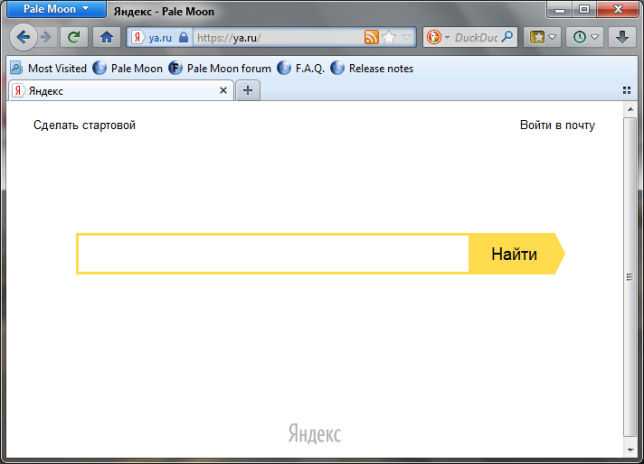
As you can see, in a word, it looks good and comfortable
Let me tell you right away that all these unnecessary buttons, the search bar (well, the one on the side of the address bar), all these bookmarks - all this can be removed and you can customize the browser for yourself.
Now about the Russian language. Let's go to this site:
palemoon.org/langpacks.shtml
Then down there we look for something like ru.xpi - this is the Russian language for the browser, look, here it is:
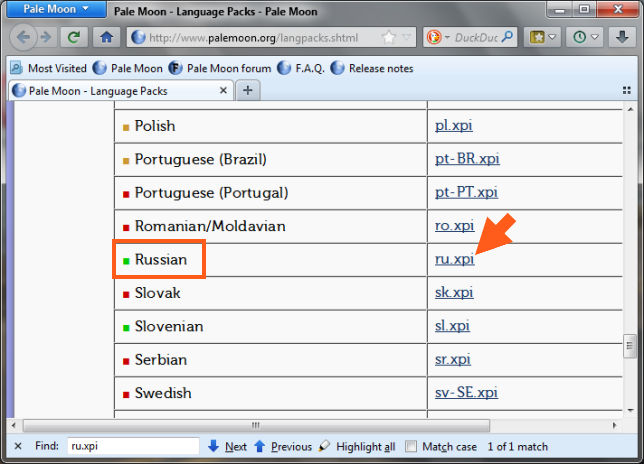
Click on ru.xpi and there will be a window like this, then click Install Now:

Then you should see the following message, saying that the language is installed normally and there are no jambs:

Almost everything, now all that remains is to activate the Russian language. See how to do it, first go to this address:
In the next message, click the I promise to be careful button:

Now look what you are doing, paste this:
general.useragent.locale
In the Search field and press enter:
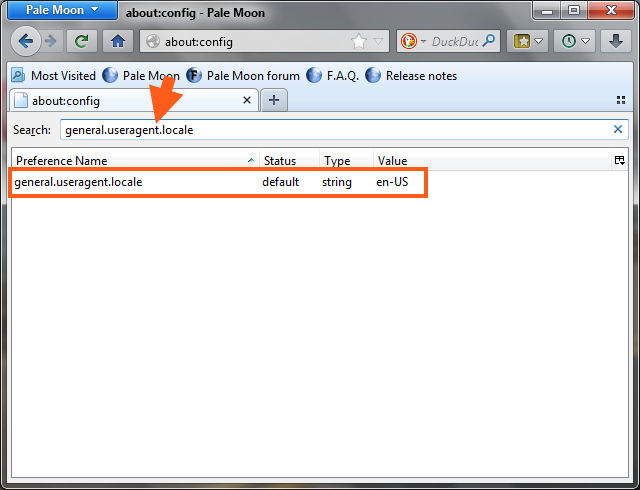
There you should see the line general.useragent.locale, this line is a parameter that specifies the browser language. Here it now says en-US, but we need to change it to Russian! To do this, double-click on this line, the following window will appear:

And here you change en-US to ru-RU so that it becomes like this:
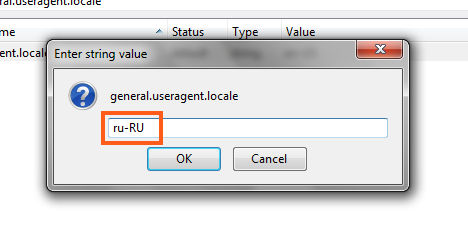
Click OK in this window and that’s it, now you can press F5 for the test, if it says that there are dragons here, then you did everything correctly:
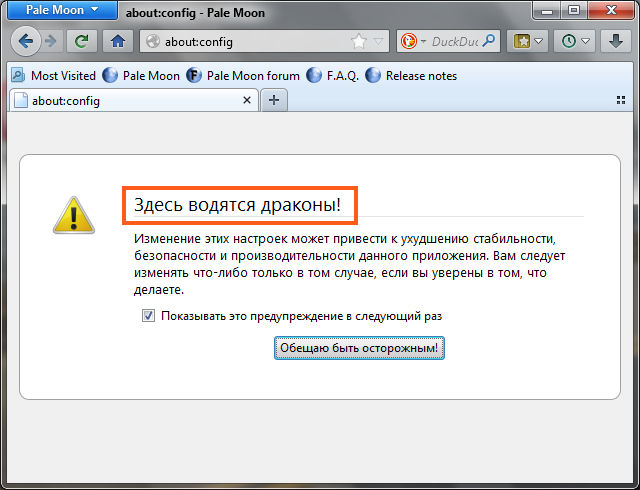
Now, for the browser to be completely in Russian, you need to close it and start it, that is, restart it
Well, that’s it, so I opened the menu and everything is in Russian:

So there is nothing complicated here. Well, without leaving the checkout, I will also show you how to install a Russian spelling dictionary in Pale Moon!
To be honest, I either don’t remember or there is simply no setting where you can add a dictionary. Therefore, I propose to do this: open any page where there is a text field, for example, I opened the Yandex search engine. And right-click on the text field and check the Spell Check box:

After that, right-click again and there will already be a Languages menu, and inside it the Add dictionaries item:

Then a tab will open, by the way Mozilla, and there you need to find Russian and click on Install dictionary. I immediately advise you to hold down Ctrl + F and enter Russian into the search, so you will find it faster:

I advise you to install the larger dictionary. Well, there are probably more words, which means a better check, well, in general, I chose the one with more...
Then you will need to click on Add to Firefox:
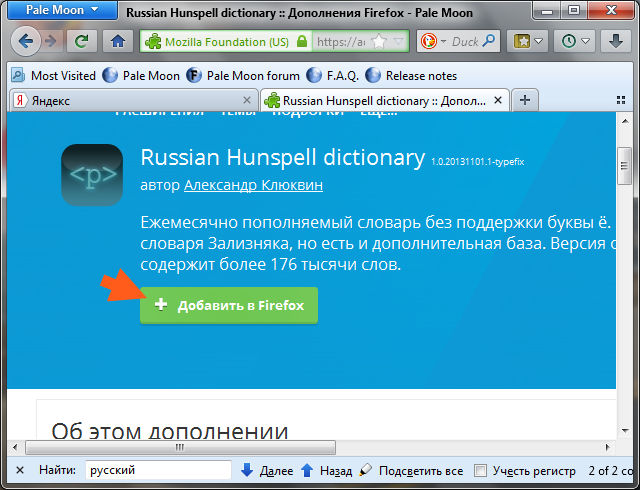

And then there will be a message saying there are no jambs, everything is installed fine:

After this, you will need to check the Spell Check box again, and then Russian will be selected automatically:

Well, you see how it all turned out. I wanted to tell you about Pale Moon, but in the end I told you how to put the Russian language into it and how to add a Russian dictionary for spell checking. Well, how could it be otherwise, this is the first thing you need to do to make the browser more or less comfortable to use.
By the way, here’s the settings window (you can get to it by clicking on the Pale Moon menu button in the upper left corner and selecting the item there):

That is, you see it as if it were Mozilla, but not quite modern. That's right. Pale Moon is not made on the latest version, but, so to speak, on the one that is still modern. In general, it supports everything, YouTube and all sites, flash and video, in general, everything works there. It’s just that the version of Mozilla, as a base, is not the most recent, but simply fresh.
I don’t know whether you will like this browser or not, but in general I don’t see any strong reasons why you might NOT like it. Here are the advantages I see in it:

Well, it looks like I wrote everything I had to! I strongly advise you to try this browser and understand that I’m not making it up, it’s really very fast and even somewhat reminiscent of Opera 12. And this, well, I’ve never seen such a browser, for me, this is the best that can be from browsers Today.
Since the emergence of the World Wide Web, called the Internet, surfing tools have begun to develop at a breakneck pace. Web browsers are used as the main tool. But not all of them are equal in their capabilities and the load they can put on the system. Let's try to figure out which browser loads the system the least, taking into account the main technical characteristics and reviews of ordinary users.
What is the load on the system?
To understand the meaning of the load, you should directly examine the currently loading content contained on a specific web resource. It is clear that if the site is a resource that presents exclusively text, there is nothing to talk about. The system reads text in any encoding and doesn’t really strain itself.
The question of which browser loads the system the least should be considered from the point of view of multimedia content or development tools provided by the browsers themselves.
If we talk about multimedia, it’s immediately worth considering that the processing tools provided in the main versions of programs are often supplemented by a fairly large number of special plug-ins. Take, for example, the same Adobe Flash Player, which is responsible for high-quality reproduction of animation, graphics and sound.

Thus, the relevant question will be not so much about which browser consumes the least resources, but about how resource-intensive the additional plugin is, because the browser itself in its pure form may not work with some elements of web pages.
Basic performance parameters
If we consider the main characteristics of the most famous and most often used tools, the first thing for any user or expert tester is the speed of launching the program itself from an executable file and the speed of opening pages.

Unfortunately, many users who are trying to figure out which browser uses less CPU or RAM, often ignore the application startup options. So to speak, in their pure form after installation, they all start quite quickly. This is only due to the fact that they do not have plugins connected, the cache is not full, there is no browsing history, etc.
Over time, any, even the most sophisticated browser with a bunch of bells and whistles turns into a clumsy hulk. The saddest thing is that even deleting temporary files does not help. And if you also take into account the initialization of plug-ins at program startup, in general, it’s worth thinking about the advisability of installing them.
Some applications have their own set that cannot be deleted, but can be disabled. For example, Chrome comes with built-in components like Adobe Flash Player or AdBlock. If everything is clear with the first plugin, the second sometimes causes legitimate complaints. It is responsible for blocking ads, pop-ups and banners, and can also prevent some auto-executing scripts and applets embedded in web pages from running. And all this takes a lot of time.
Opening pages with preliminary content analysis directly depends on the content. Any modern browser takes a fraction of a second to do this. Again, it all depends on the plugins - the more there are, the slower the program runs. And incorrectly installed or incompatible add-ons slow down the system even more.
Which browsers use less memory?
But let’s start checking the means of Internet access themselves. Here you should take into account the consumption of RAM, virtual and physical memory. If you understand the question of which browser loads the system the least, you should pay attention to the basic default settings and the size of the allocated cache.
Cached data, although it allows you to open the most frequently visited pages by storing some elements on the hard drive, is nevertheless capable of clogging up the system too much and causing programs to freeze. This is due to the constant analysis of loaded structural elements of pages. If there is a sufficiently large number of them, more time is required for analysis and loading.
In this regard, the best performance, judging by user and expert reviews, is shown by Internet Explorer 11, Edge from Windows 10, Mozilla and Google Chrome. Opera, although a very popular means of accessing the Internet, is much slower. In addition, today you can find so many versions of the program in unofficial sources that you don’t always know whether a given product is safe.
and reviews
If you look at it, you can make a list, which, as you would expect, contains only programs from the most famous developers:
- Internet Explorer;
- Edge;
- Opera;
- Mozilla Firefox;
- Chrome.
It would be possible to add here some programs like Amigo, Yandex Browser, 360 Safety Browser or something else. But they are specifically not included in the list, since they are built on the basis of Chrome and are not of interest as truncated or expanded derivatives of the main product. Often, due to unfinished technologies and algorithms, many more problems arise in them than in the parent product. This is evidenced by clearly unflattering statements from users.
Now let’s look at the question of which browser loads the system the least in a little more detail.
Internet Explorer
Users have an extremely negative attitude towards IE, which is part of any Windows operating system, since early versions of the program were so unfinished that it was not even possible to talk about any ease of working on the Internet.

Over time, Microsoft developers revised the basic concept of the browser, resulting in the 11th version of the application. No matter what anyone says, Internet Explorer 11 in all respects surpasses Mozilla, Chrome, and even more so Opera. The load is minimal, startup is much faster than similar applications, clearing the cache and temporary files does not require user intervention, as it was before (you had to clean the Temporary Files folders manually).
Edge
The same Internet Explorer became the progenitor of a new generation browser called Edge, which appeared only in Windows 10 (a version is not provided for systems of a lower rank).

This application rightfully occupies the top positions in all ratings. Most of the background processes when starting the program are automated, the start takes place within a couple of seconds, opening pages even without installing the accompanying plugins is very fast. By the way, you don’t need to install add-ons - everything comes included here.
Another thing is that this browser is somewhat inconvenient to configure, especially in terms of disabling extensions. And the default start page (news, weather, advertising, etc.) is a little annoying. But all this can be disabled if you set the dummy at startup, similar to how it is done in IE.
Opera
The notorious "Opera", although revered by many, has recently lost ground. Despite the convenient and fairly simple interface, performance leaves much to be desired.

Even at startup, you may notice that it takes too long to access the hard drive, as well as when completely clearing the cache and deleting temporary files. True, one of the advantages is the ability to quickly configure, disable or remove extensions. But this in no way can affect the overall rating.
Mozilla Firefox
The search for an answer to the question of which browser loads the system the least cannot do without this browser.

Light and fast - that's what you can say about it. However, not all users appreciate it fully. The fact is that “Fire Fox” cannot be considered as the most primitive means of accessing the Internet. This browser is more suitable for web developers and can be used as a complete platform for creating web applications. The tools here are much wider than what other favorites on the list offer.
Chrome and browsers based on it
Chrome is considered the fastest of all existing browsers. Developments based on it are fast only after the first installation, but over time they begin to slow down incredibly.

The speed of launch, the speed of opening pages, and the ease of setup or management are excellent. Plus - the largest number of developed plugins and extensions. The question is different. Is it worth installing them? This is something everyone decides for themselves. Nevertheless, in all the main indicators in the popularity lists, this browser is not inferior to Edge.
What to choose?
So, we choose. Of course, preference (based on user reviews) could be given to Microsoft products, however, it is believed that the best option would be to install Chrome.

And here the choice is supported not only by technical characteristics or performance parameters with minimal load on the system. If you look more broadly, you will notice that the latest version of the application supports RDP (remote desktop) technologies and can be used as the main client for connecting to computers and laptops, even from mobile devices.
Thus, the balance in the question of which browser loads the system the least, is the easiest to manage and configure, clearly tips in favor of Chrome, although this assessment is based solely on ratings, nothing more.
Let's take a closer look at the most popular browsers for personal computers and laptops running Windows in the world and in RuNet, in particular. We will try to evaluate them as objectively as possible. advantages And flaws for the user. The main and most important characteristics are speed, ease of use, safety, functionality.
Before moving on to the review, let's turn to statistics, provided by leading web analytics companies.
The latest data on the share of users in the world at the beginning of 2017 was provided by the Net Applications agency. It is worth noting that these statistics have not undergone global changes for several years. 
Several companies maintain statistics on Russian-language Internet users, including OpenStat, LiveInternet and HotLog. 
As we see, confident leadership in RuNet and in the world beyond Google Chrome.
But these are just statistics. In order to fully experience the quality of the work of reviewers, it is worth trying them all in action, because everyone may have their own specific wishes and preferences.
Mozilla FireFox – free web surfing 
If you prefer simple interface, with minimum extra buttons and tabs, then this browser is definitely worth trying. During the initial installation, you will receive a minimum of functions, which for some is even better - easy to use.
You can expand the functionality using numerous plugins And extensions, of which there is simply a sea (more than 100 thousand at the moment). 
Features a high level security Your personal data and passwords. Easy to setting.
An important advantage is blocking pop-up windows and RSS support. Updates independently, without user intervention. 
High rates of development allow the observer to successfully compete with the leaders of the ratings, but it is still slightly inferior in performance the next browser in our review.
Google - Internet at the speed of Chrome 
Chrome offers the greatest speed of work. The functionality is very well thought out. Features a very convenient multilingual interface, which all other browsers are trying to copy with varying degrees of success.
Browser automatically blocks pop-up windows, in the search bar you can enter both the site address and the search query. 
Extremely convenient quick page translation. Supports operating mode by several users.
It's more than just a browser - it's a platform for web applications. Built-in Flash player, it is possible to view PDF And DOC files directly in the browser window. For some, the function of enabling the mode may be useful incognita to disable tracking of your online activity and recording of your Internet activity.
Lots of extensions, unfortunately, not all of them are of high enough quality, since many are created by third-party developers. Because of them, there may be a decrease in operating speed, so you should install only proven plugins and extensions.
From shortcomings can be noted quite high loading RAM when opening multiple tabs, as well as tracking your interests, location and displaying advertising based on this information.
However, in general, it is not for nothing that this reviewer occupies a leadership position in Russia and the world, so we can recommend it first of all.
Opera - convenient, safe, fast 
The once most popular Internet browser in Russia is now losing more and more popularity every year. But its Mini version for smartphones is still used by the majority.
Among advantages should be noted comparatively fast work, will be very useful for low-power computers. The speed can be further increased by using the " Turbo». 
Easy to configure, can install about a thousand extensions And plugins. Has a pleasant interface.
TO cons Considering the large amount of loaded RAM, some sites may not be displayed entirely correctly.
Yandex Browser - fast with turbo mode 
Recently, a Russian-made columnist has become increasingly popular. True, the same engine is taken as a basis Chromium, and therefore the interface is similar to Chrome, but it must be admitted that it is a little more adapted for Runet. 
Among the differences, we note the unusual animated background Internet Explorer, which improves perception. Interface simplified to a minimum. Various panels take up less space, resulting in a 20% increase in site visibility. Services integrated Yandex disk, mail, online translator and other specialized ones.
For some, the simplified interface may be a disadvantage; it will take time to get used to it. If you do not connect to various Yandex services, the browser will work limitedly.
Tor Browser Bundle – incognito mode 
Not represented in the rating, which is no wonder - the browser is intended for users who want hide your data, spies trying to work on the network in incognita.
Basically it's Thor modified Mozilla FireFox, with a similar interface and functionality. But with its use you can hide your IP address, location and other personal data.
However, the cost of protecting your information will be significant. decreased productivity. That is, pages will open slowly, since traffic will be redirected through servers in many countries. You will constantly have to enter a captcha in a search engine in order to be checked to see if you are a robot.
If you care about privacy online – we recommend trying Tor Browser.
Internet Explorer - always at hand 
Explorer is the grandfather of all modern browsers. Now he has already lost his position significantly. In all respects - security, speed, convenience, it is quite weak.
However, in the latest version, Internet Explorer 11 tried to get closer to the leading browsers and mitigate a number of shortcomings. 
However cons its use is still too many, because few users give it their preference.
Microsoft Edge– new fromMicrosoft 
Microsoft does not give up and in 2015 creates a browser that is rapidly increasing the number of its fans. It replaced Internet Explorer in Windows 10. 
Increased number of supported extensions, operating speed increased thanks to the use of the new EdgeHTML engine. Fully integrated in Windows 10, it cannot be used in other versions. We also worked on security.
From shortcomings– some sites may not be displayed correctly, the menu is not functional enough, and it is difficult to customize for specific tasks.
At work I have a weak, outdated computer with 512 meters of RAM and Windows XP.
The eternal problem is that it slows down and freezes, especially at the end of the day.
I clean Windows with all sorts of cleaners, utilities, optimizers, but I don’t get any noticeable effect.
There is an eternal problem with browsers - they load the system, eating up the already frail RAM. My beloved Opera is finally disappointing. She became like Firefox - fat and clumsy. Google Chrome, which is praised so much as the fastest and clearest, is not fast and clear on my computer, for some reason it loads the system and the flash player in it is always glitchy. It finally has a wonderful feature: it updates itself in the background without asking. And this cannot be turned off anywhere. Suddenly the computer starts to slow down terribly, I go to the task manager - and this dear Chrome has decided to update and is loading the CPU by 80%.
Chrome, Opera, Firefox, Yandex browser are not suitable for weak computers. A special horror begins when entering heavy sites like slando or ria.ua - a bunch of loading interface elements, the browser slows down and drags the entire computer along with it.
I would like to say about the Opera that it is like the Dynamo football club (Kyiv). He has been loved by everyone for a long time, but has fallen behind in development and has become heavy and weakly developing, glitchy in modern conditions, but still having an old crowd of loyal fans who suffer, but use it and are all waiting and waiting for him to become the best and most competitive again. A huge plus of Opera is its awesome customizability. Lots of settings, you can customize the browser to suit you and your needs. Chrome settings - the cat cried.
I looked through a lot of information on the internet, read a lot of opinions and reviews. I was looking for a EASY browser that would consume less resources on a weak computer. I installed several little-known browsers that position themselves as “light and fast.” For example, Browsar Winstyle. Yes, they are light and fast. But they're not convenient and don't work well. So that's not an option either.
In the end I settled on Comodo Dragon. Externally and internally it is similar to Chrome, because it is made on the open source Chromium engine. Calls itself "a faster, more secure version of Chrome."
And guess what? Yes, yes! I achieved what I wanted - the browser works quickly on my weak computer. Really fast compared to others, loads pages and all content correctly. I don’t know how it works in Windows 7, but in XP it’s great. Heavy modern sites load significantly faster than in other well-known browsers.
For those who have a weak computer and Windows XP, I highly recommend the Comodo Dragon browser
